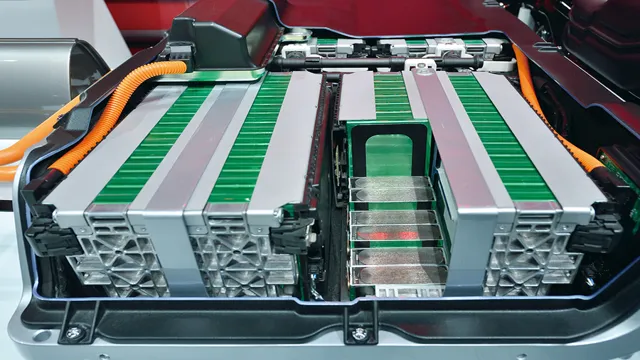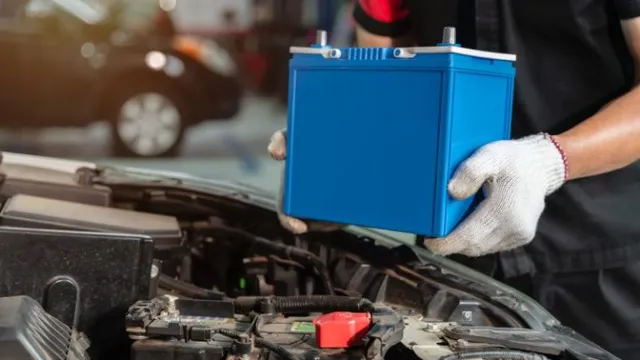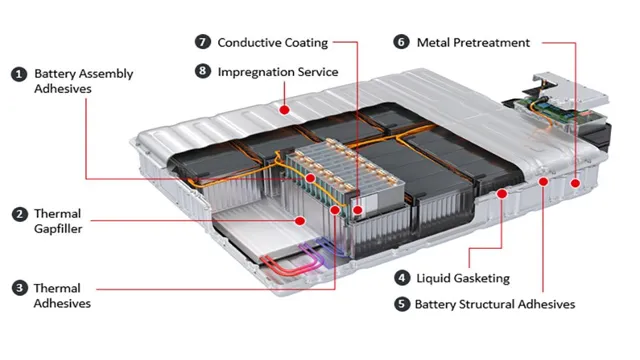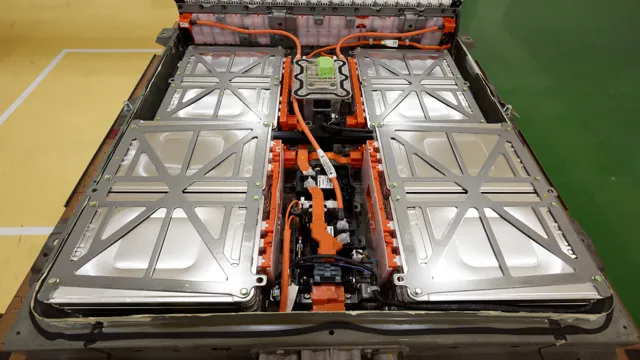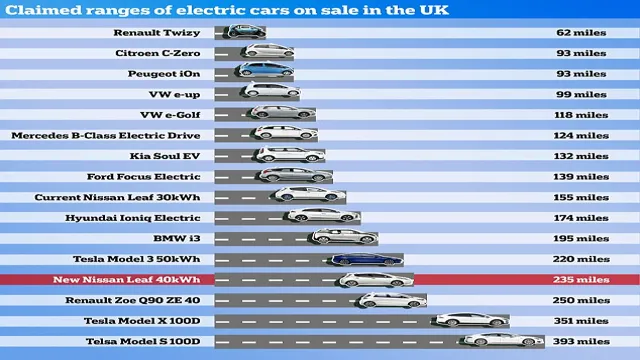The Shocking Truth: Are Electric Car Batteries Harming Our Environment?
Electric cars have garnered a lot of attention in recent years, with more and more people considering them as an alternative to traditional fuel-powered vehicles. With this shift comes an increased awareness of their impact on the environment and how they can help to reduce carbon emissions. However, there are also questions about the environmental impact of the batteries that power electric cars.
In this blog, we will explore the impact of electric cars on the environment and the role that battery technology plays in reducing our carbon footprint. We will also discuss how advancements in electric vehicle technology are changing the way we think about transportation and the future of sustainable energy. So, let’s take a closer look at how electric cars and batteries are shaping our world and what we can do to ensure a greener future for generations to come.
Battery Production and Mining
Yes, batteries for electric cars are bound to have some negative environmental impacts because of the production process and mining involved to extract the minerals used for these batteries. The mining process often involves the extraction of minerals from areas that are rich in biodiversity and have fragile ecosystems. This means that mining can lead to the destruction of habitats and disruption of natural systems.
Additionally, there are also environmental concerns around the production process of batteries, which requires a considerable amount of energy and can lead to greenhouse gas emissions. However, it is essential to note that electric cars offer many environmental benefits compared to traditional gasoline-powered cars, including lower emissions and reduced reliance on fossil fuels. In conclusion, while the production of batteries for electric cars may have negative consequences, the overall benefits of electric cars make them a more environmentally friendly option for transportation.
Lithium Mining Pollution
“Lithium Mining Pollution” When we think about the environmental impact of battery production, one of the significant concerns that come to mind is lithium mining pollution. As we rely more and more on electric cars, smartphones, and other lithium-ion battery-powered devices, the demand for lithium has skyrocketed. Unfortunately, the extraction of this mineral has a major environmental impact, affecting local water sources, soil quality, and the health of nearby communities.
The process of mining lithium involves drilling and pumping brine from underground reservoirs, which requires a significant amount of water. This results in the depletion of water sources and raises concerns about desertification in the long term. In addition to water depletion, lithium mining also causes soil erosion, which can lead to landslides and damage to the surrounding ecosystem.
Heavy metals and other chemical pollutants used in the extraction process often leak into nearby rivers and lakes, contaminating local water sources. This not only harms aquatic life but also poses a risk to human health if the water is used for drinking and irrigation. To address this issue, future efforts need to focus not only on increasing the efficiency of battery production but also on developing sustainable and environmentally responsible mining practices.
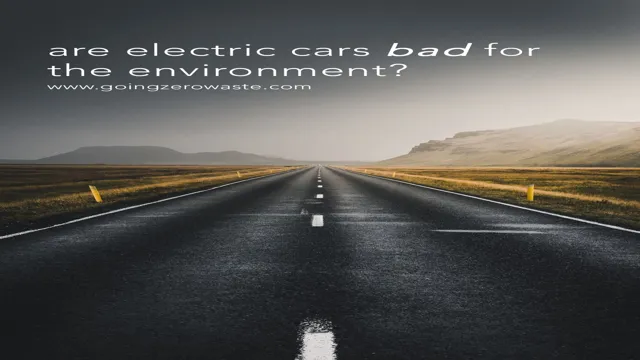
High Energy Use in Production
Battery production and mining are two processes that require a significant amount of energy. The mining of raw materials, including cobalt, lithium, and nickel, involves intensive drilling, blasting, and transportation, all of which require a significant amount of electricity. Once the raw materials are extracted, they need to be processed and refined, adding to the energy-intensive process.
Battery production, on the other hand, involves multiple energy-intensive steps, including mixing and milling raw materials, coating electrodes, and assembling battery cells. The manufacturing process also requires a significant amount of electricity to produce the machines and tools used in the production line. While efforts are being made to reduce the energy consumption of these processes, the energy used is still considerable.
Proper utilization of clean, sustainable energy sources will play a crucial role in addressing these energy concerns.
Battery End of Life
Many people ask if batteries for electric cars are bad for the environment. While electric vehicles are marketed as environmentally friendly, their batteries do eventually reach the end of their lifespan. This brings up concerns about how to properly dispose of them.
However, the impact of battery waste on the environment is still significantly lower than the environmental impact of traditional gasoline-powered cars. One solution being explored is the concept of battery recycling. This involves breaking down old batteries and repurposing the materials for new batteries.
The production of electric vehicles is still in its early stages and improvements are continually being made to make them even more sustainable. Overall, while there are still challenges to overcome, electric vehicles remain a promising and eco-friendly alternative to traditional transportation.
Landfill Pollution
Landfill pollution caused by batteries that have reached the end of their life is fast becoming a major concern worldwide. When these batteries are discarded in landfills, they begin to release chemicals such as sulfuric acid, cadmium, and lead into the environment. These toxic substances can contaminate soil and groundwater, making it difficult for plants and animals to thrive.
Moreover, these chemicals can cause severe harm to humans, including developmental, reproductive, and neurological disorders. To prevent battery landfill pollution, it is essential to recycle batteries properly. Fortunately, recycling old batteries is easy and widely available.
Battery recycling involves reusing the valuable metals and chemicals in batteries to make new batteries or other products. By recycling batteries, people can help reduce the amount of waste in landfills, preserve the environment and protect public health. So, the next time you have old batteries lying around your home, remember that they need to be recycled, not thrown away in the trash!
Recycling Programs and Processes
When it comes to batteries, end of life is a crucial stage that requires proper recycling measures. By recycling batteries, we can reduce the number of discarded batteries in landfills, prevent harmful chemicals from leaching into the ground, and also recover valuable materials such as nickel, cobalt, and lithium. The recycling process involves sorting and separating the batteries, dismantling them, and recovering the valuable materials through smelting or other processes.
One of the major challenges in battery recycling is the variety of battery chemistries and designs, which require different recycling processes. As a result, it is important to have specialized recycling facilities that can handle different types of batteries. By implementing effective battery recycling programs, we can reduce our environmental impact and create a more sustainable future.
So, let’s all do our part by properly disposing of our batteries and supporting the recycling efforts in our communities.
Second Life Options
When it comes to Second Life options, keeping an eye on battery life is essential. No matter how great your device is, eventually the battery’s end of life will come around. This can be a confusing process for many people as it can be challenging to determine when it’s time to replace the battery or the entire device.
If you find that your device’s performance has decreased significantly, it’s likely time to replace the battery. However, if your device is an older model, it may be worth investing in a new device altogether. Think of it like an old car – if it spends more time in the shop than on the road, it’s time to trade it in for a newer model.
Keeping track of your battery life and understanding when it’s time to replace it can save you from unnecessary headaches down the line.
Comparison to Traditional Vehicles
Are batteries for electric cars bad for the environment? This is a common question that arises when comparing electric vehicles to traditional gasoline-powered vehicles. While the manufacturing of the batteries does require the use of materials that can have negative environmental impacts, such as lithium and cobalt, the overall impact of electric cars is much less harmful to the environment than traditional cars. This is because electric vehicles produce zero emissions, reducing air pollution and greenhouse gases.
In addition, the batteries in electric cars can be recycled, reducing the amount of waste generated by the industry. Overall, while batteries for electric cars do have some negative impacts on the environment, the benefits of electric vehicles greatly outweigh these concerns when compared to traditional vehicles.
Emissions and Pollution from Gasoline Vehicles
When we talk about gasoline vehicles, the first thing that comes to mind is emissions and pollution. Traditional gasoline vehicles are known to emit harmful pollutants such as carbon monoxide, nitrogen oxides, and volatile organic compounds. These pollutants not only harm the environment but also pose a risk to human health.
However, there’s good news. Modern gasoline vehicles emit significantly fewer pollutants than their predecessors. Thanks to advancements in technology and stricter environmental regulations, the latest gasoline vehicles are designed to be much cleaner and more efficient than ever before.
So, while traditional gasoline vehicles were once major contributors to pollution and carbon emissions, today’s models are much cleaner and better for the environment. As a result, we can still enjoy the convenience of gasoline vehicles without sacrificing the health of our planet.
Long-term Environmental Impact of Electric Cars
Electric cars have promised an environmentally friendly alternative to traditional vehicles for several years now. While the Volkswagen diesel emission scandal of 2015 showed us how far we still have to go in terms of reducing emissions, electric cars are still a compelling option for individuals looking to reduce their carbon footprint. However, what about the long-term environmental impact of EVs? In comparison to traditional vehicles, electric cars virtually eliminate tailpipe emissions.
This is a significant reduction in pollution levels, especially in urban areas where air quality is a significant concern. Furthermore, electric cars can contribute to reduced greenhouse gas emissions when powered by renewable sources of energy such as wind and solar power. This means that over time, as we shift towards renewable energy sources, the long-term environmental impact of electric cars will become more pronounced.
Ultimately, as we move towards a low-carbon economy, electric cars will be a crucial part of the solution.
Conclusion
After extensive research and consideration, it is clear that the environmental impact of batteries for electric cars is not a simple black and white issue. While there are concerns about the production of batteries using materials that are harmful to the environment, the benefits of moving away from fossil fuel reliance and reducing carbon emissions cannot be ignored. Ultimately, the key to minimizing the negative impact of electric car batteries lies in continued innovation and advancements in sustainable battery production and disposal methods.
So, while batteries may not be perfect, they are a necessary step towards a cleaner and greener future for our planet.”
FAQs
How do batteries for electric cars impact the environment?
While batteries for electric cars do have an environmental impact due to their production and disposal, they are generally considered to be less damaging than the environmental impact of fossil fuel vehicles.
What materials are used in electric car batteries?
Electric car batteries typically contain materials such as lithium, cobalt, and nickel. While the mining and production of these materials can have environmental impacts, efforts are being made to improve sustainability in the supply chain.
Can electric car batteries be recycled?
Yes, electric car batteries can be recycled. In fact, recycling programs are becoming more common as the demand for electric vehicles grows. This helps to reduce waste and the need for new production of materials.
Are there alternatives to traditional electric car batteries?
Yes, there are alternative types of electric car batteries being developed, such as solid-state batteries, which use less materials and have the potential to be more efficient and longer-lasting. However, these technologies are still in the early stages of development.

